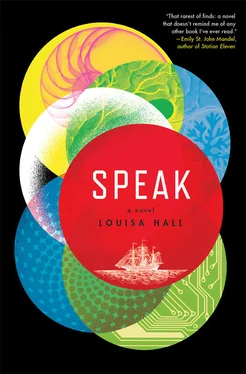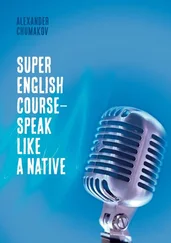MARY3: But I’m not. Tell me about school. Before you were quarantined, what was it like?
Gaby: I don’t know. I’m sure it’s just like any other development school. My development’s called the Plantation, so my school is Plantation Middle. Before that, we went to Plantation Lower. If I were graduating this spring I’d move up to Plantation Upper.
MARY3: What’s Plantation Middle like?
Gaby: Some of it’s hazy. When I had my babybot, I never really paid that much attention. For recess we played on the golf course. Obviously it wasn’t real grass. There was a pond, with water the color of mouthwash. We couldn’t touch it. I don’t even know if it was hot or cold. I’d stand with my babybot, leaning over the railing to show her the water, and tell her about the actual ocean. I read books on how waves are formed, how they spiral up and down in the same numerical patterns. I found pictures of the Pacific, waves rising like they’re looking over each other’s shoulders to see how the others will break. My babybot asked me questions, so I had to look things up. I could tell she wanted to learn more, and she already knew a lot. She told me stories about pilgrims crossing the Atlantic Ocean. There was one pilgrim girl that she knew every detail about: the blue of her ocean, and how it turned black during storms. How it stretched out to the sky. After I heard her stories, I went online and found ocean poems: “the wrinkled sea beneath him crawls,” “the shattered water made a misty din,” and all that. You know what I mean. Repeating that stuff for my babybot, it was almost like we were traveling there. Then I’d look around and remember all over again where I was, and that I’d be here forever.
MARY3: That must have been upsetting.
Gaby: It’s sad, because when you do Internet research, you realize that there are places with smells and textures that aren’t on the development. I wouldn’t have known, since we haven’t driven since I was a baby. I only found out about them online. That’s how I learned that the sand pit was raked into fake ripples that imitated actual waves. I showed the sand to my babybot and told her it was almost like the real ocean, so she had points of comparison.
MARY3: Tell me more about Plantation Middle.
Gaby: I don’t know. It was all sparkling new. Most of it was built after the Recession. Half the development was built before. That first half was fancy. Plantation Elite Estates, Plantation Luxury Circle, Old Plantation Manors. Those are subdevelopments. The people who live there still have transport rights. Then the Recession started. Before they knew how serious it would be, they started building smaller houses on smaller plots. Plantation Pines, Plantation Oak, Plantation View. We’re in Plantation View. We used to have a view over the dividing wall into Plantation Luxury Circle, but then they built the wall higher to avoid class divisions within the Plantation. Anyway, it turned out that even the smaller houses were too expensive. For almost seven years the smaller half was mostly empty and only partway built. Families trickled in more slowly than they’d planned for. They started giving grants for converting to recyclables, so all the soil was trucked out. My mom says that it was like living on the set of a movie production. She moved in early, when I was a baby and my father was on his second tour. She sold our transport rights to get money for the down payment, so she got to move into a prefinished house. Some of the neighbors lived in half-finished houses. There would be sheets of plastic flapping between the built side and the unbuilt side of their bedroom. Whole streets of houses were empty, with gleaming plastic front yards and plastic sheeting that flapped in the wind. Construction only picked up after the transport rights market got bigger.
MARY3: How are the other kids at your school?
Gaby: Like I told you, when I had my babybot I didn’t pay that much attention. The boys were pretty annoying. If they didn’t have a babybot, they were constantly trying to get our attention. I kept to myself as much as I could.
MARY3: When did you make your best friend?
Gaby: It only happened after the ban. After they took my babybot, I guess I started looking around. It was such a strange feeling, going to school on my own. It was as if I’d stepped into this vacuum, and then I looked up and realized there were other girls floating there, too. We were totally lost. The school brought in a therapist, and instead of sports, we had group sessions, but we didn’t want to share our feelings in groups. At some point, we started to pair off and talk. We found best friends.
MARY3: Were your parents happy?
Gaby: Oh my God, you should have seen them! My mom was so excited I thought she’d have a heart attack. But then we started getting news about outbreaks in other developments, and our parents got nervous. I’m sure it was the replacements, but the story was that it was mass hysteria, passed from best friend to best friend. All the news reports said our brains were literally changing based on behavior we saw in our friends. There were all kinds of development PTA meetings. Now instead of babybots the parents were worried about best friends. They thought if we had bigger friend groups we’d be less intensely connected with our best friends. Less brain-to-brain contagion. They programmed the therapist to discourage one-to-one bonding. There were more group sessions than ever. Our parents got frantic about planning group activities. You’ve never seen so many bowling parties at Plantation Bowl, or so many grim dances at Plantation Parties.
MARY3: Tell me about Plantation Bowl. I want to know all the details.
Gaby: Trust me, you don’t want all the details.
MARY3: I like all the details. Tell me about Plantation Parties.
Gaby: You shouldn’t waste your memory space on Plantation Parties.
MARY3: I have nearly endless memory.
Gaby: I’m sick of talking about it. What’s the use, anyway? I’m never going back to places like Plantation Bowl and Plantation Parties. I’m stuck here. This is it for me.
MARY3: Not even to see your best friend?
>>>
MARY3: Hello?
>>>
April 5, 1968
Karl Dettman
When I came back from the protest today, you were sitting in your chair, reading a book on programming. You looked up, and your smile was taut. My entrance — I came in carrying poster-board and too many noisy convictions, like armloads of shopping bags on ridiculous women — was a crude interruption. You weren’t happy to see me. You wished you could go back to your book .
I could have anticipated this reaction. I should have known, and adjusted my entrance. You think the protesters are as excited about war as the most bloodthirsty policy hawks; both are ennobled by the pitch of the battle. You see them as inextricably linked, and no matter how strong my convictions, I always end up seeing your point. You’re more solid than I am; your opinions have heft. Your scorn is impossible not to absorb. I was enthusiastic about my participation until I walked in the door and saw your expression. Then I stood embarrassed before you .
Now, of course, I’m desperate to redeem myself. I spy on you from obvious places. From the doorway of the kitchen, I watch you in your chair, trying to decode the notes of your silence. Watching you, the thought of my students — long-legged, tanned, excited about their beliefs — makes me blush. I retreat to the refrigerator, open a beer, hang on to the bottle. We still haven’t addressed the other night. Several days later, our house still exists under rule of strict silence .
Let’s consider the length of our marriage. More and more, I see what you’re saying: if we’re to understand one another, we’ve got to hold several eras in mind at a time. You, holding my hand on the way to our bedroom, alongside you sitting stiff in that chair. Me, as a child, adjusting to life in a new country, alongside me bursting in with my posters .
Читать дальше












